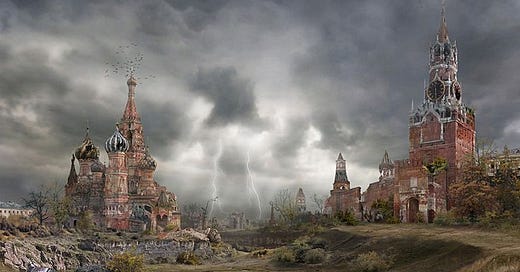😞 A country without a positive vision of the future has no future. Just look at Russia.
Also: 5 Quick Questions for … 'A Culture of Growth' author and economic historian Joel Mokyr (part one) 📈
In This Issue
The Essay: A country without a positive vision of the future has no future. Just look at Russia.
5QQ: 5 Quick Questions for … A Culture of Growth author and economic historian Joel Mokyr (part one)
Micro Reads: lead exposure and IQs, robots in the 2020s, tech geography, and more …
Nano Reads
Quote of the Issue
“What gives me confidence that the imaging [of the future] process is basically a sound one, is that, despite cultural differences, the same basic image themes appear in the imagined utopias of the ancient past as appear in the imagery of our late-20th century imagers — a clean, green world of abundance, joyfully shared by men and women. This kind of imaging is a special human gift, that no follies have been able to extinguish. And as long as we can imagine a better world with minds adequately equipped for the complexities of the 21st century, we will be able to work for it.” - Elise Boulding
The Essay
😞 A country without a positive vision of the future has no future. Just look at Russia.
“Great nations,” posited 19th-century English art critic John Ruskin, “write their autobiographies in three manuscripts, the book of their deeds, the book of their words and the book of their art. Not one of these books can be understood unless we read the two others, but of the three the only trustworthy one is the last.”
Art historian Kenneth Clark adds his own twist on Ruskin in the magisterial 1969 documentary series Civilisation, “If I had to say which was telling the truth about Society, a speech by a minister of housing or the actual buildings put up in his time, I should believe the buildings.”
What society says about itself through its fine arts, architecture, film, literature, television, and video games matters deeply. It’s why Faster, Please! covers more than just business, economics, public policy, and technological trends. It’s why I write about what Soylent Green illustrated about 1970s eco-pessimism, and why it’s important for Hollywood to produce more optimistic sci-fi works such as For All Mankind and Interstellar.
Keep reading with a 7-day free trial
Subscribe to Faster, Please! to keep reading this post and get 7 days of free access to the full post archives.



